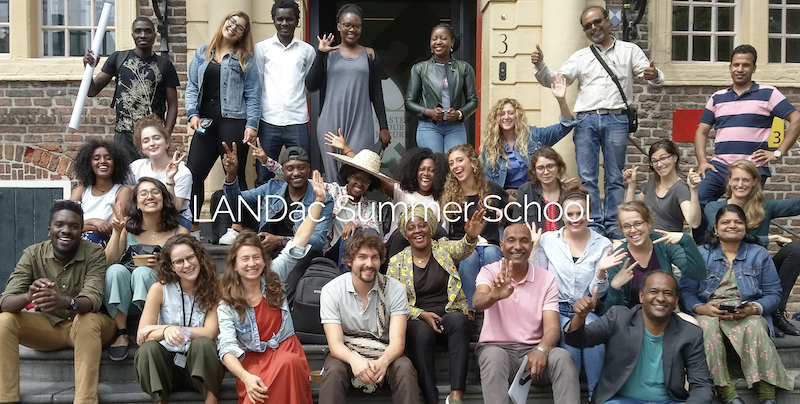Welcome to the LANDac (the Netherlands Land Academy) Annual Summer School “Land Governance for Development”. Large-scale acquisition of land in the Global South has received a great deal of interest in the last few years. This course provides a multidisciplinary analysis of the ‘land rush’ within the more general context of land governance in Africa, Asia and Latin America. We will look at the history and drivers, the diversity of stakeholders and networks involved, the urgency of current challenges and innovative governance solutions.
The large-scale acquisition of land in the Global South – often referred to as “land grabbing” or “the global land rush” – has received much attention from academics, policy-makers and the media in recent years. Especially following the food crisis (2003-2008) and stimulated by the growing demand for bio-energy, pressure on land in developing countries has intensified. Besides the demand for agricultural land, current land acquisitions are also related to tourism development, mineral extraction, industrial development, urbanisation and even nature conservation. Local populations are often left defenceless in this ‘rush for land’ and governments lack capacity to address these challenges – or are sometimes themselves the drivers. As a result, access to and use of land and other natural resources, particularly in the developing world, is being transformed irreversibly. Moreover, COVID-19 and the measures taken worldwide to curb the pandemic are of great concern to the land governance community, as alarming observations are coming in about the loss of livelihoods and deepening poverty, but also of government crackdowns on civil society, the suspension of land administration services and irregular land acquisition.
Land governance in developing countries must deal with the multiple pressures and competing claims, whilst balancing economic growth, environmental protection and social justice. This course provides a multidisciplinary analysis of the ‘land rush’ within the more general context of land governance in Africa, Asia and Latin America. We will look at the history and drivers of the process; the diversity of stakeholders and networks involved; and the global policy instruments of which inclusive land governance is an integral feature, such as the Sustainable Development Goals and the New Urban Agenda; as well as highlighting the urgency of current challenges and discussing innovative governance solutions.
Set-up of the course
The course is organised by the Netherlands Academy for Land Governance (LANDac), a network of organizations interested in how land governance may contribute to sustainable and inclusive development. MSc students, PhD students and professionals from development organisations and related projects will acquire up-to-date knowledge on new land pressures and learn how to place these in broader theoretical contexts and policy debates from the local to the international level.
Topics are discussed in interactive lectures, as well as within a group assignment. The design of the course allows for participants to closely work together with professionals, experts and fellow students from a variety of backgrounds. Topics are discussed from a range of perspectives, with contributions from Dutch and international academics as well as development practitioners.
The lectures in the two-week course provide a general overview of important themes such as the global land rush, land governance, land administration and land issues in post-conflict situations. The group assignment will complement this general overview by illustrating the issues and trends in specific contexts through case study analyses.
We aim to organise a face-to-face Summer School. Depending on the situation and the possibilities for participants to travel, we might facilitate an online component.
Target audience
The course is designed for Master’s students, PhD students, academics; as well as for practitioners from development organisations, projects and governments who are interested in or work in the fields of land governance, development studies, natural resource management, planning, human rights and conflict studies.
Aim of the course
The course provides participants with thorough knowledge of current problems as well as academic and policy debates related to land and development. Participants also build understanding of practical knowledge and possible solutions. The guiding objective is how best to optimise the link between land governance, inclusive sustainable development and poverty alleviation.
Study load
Mo-Fri from 9.00 - 17.00
Costs
The course will this year take place in hybrid form. This means it is possible to follow this course on location in Utrecht or online. Participants on location will follow the entire course. The online participants will join in half days. In the day-to-day program you can see which activities are for the participants online, on location or both.
Because the online participants can only join in half days, there is a reduced fee. The fee for the course will then be €200,-. Please note in your application if you want to participate online, the reduced fee will be applied after application.
There are no scholarships available for this course.
More information
Registration

